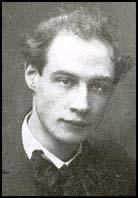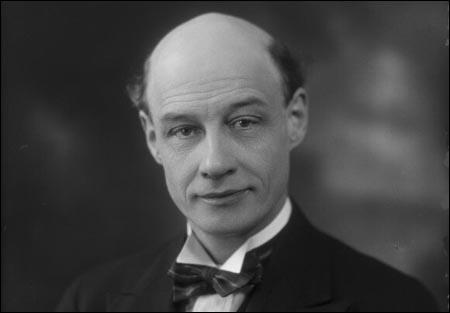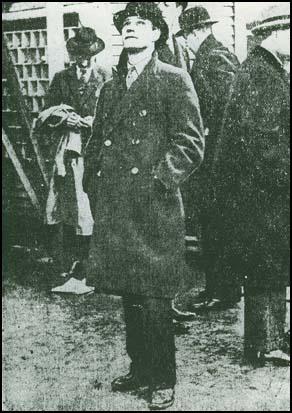John S. Clarke

John Smith Clarke, the thirteenth of fourteen children, was born in Scotland in 1885. His father worked in a circus and Clarke spent much of his early life living in gypsy encampments. After receiving little schooling he joined the circus as a horse bareback rider. At the age of seventeen he was working as a lion tamer. According to Gordon Munro: "He received the first of many injuries a few days later when a hurt lion attacked him when he entered the cage to help it."
In 1902 several political activists left the Social Democratic Federation (SDF), an organization led by H.L. Hyndman, to form the Glasgow Socialist Society. Eventually, most of the members of the SDF in Scotland joined this new group. In August 1903 it was renamed the Socialist Labour Party (SLP). The organization that had been inspired by the writings of Daniel De Leon, the man who helped establish the International Workers of the World (IWW) and the Socialist Labor Party in the United States. Clarke, who had been converted to socialism, joined the SLP. Leaders of the group included Willie Paul, Jack Murphy, Arthur McManus, Neil MacLean, James Connally, John MacLean and Tom Bell.
Clarke eventually became joint editor of the SLP journal, The Socialist, with Willie Paul, Tom Bell and Arthur McManus. In 1906 he began to organize the transport of weapons to revolutionary socialists in Russia. The operation lasted until the discovery of a cache at Blyth in Northumberland.
In 1910 Clarke moved to Edinburgh where he became editor of The Reform Journal. He also worked as a private secretary of the author Jane Clapperton (1832-1914).
John Clarke was opposed to Britain's involvement in the First World War. The historian, Nicola Rippon, has argued that "Clarke was not a pacifist, believing that the only armed struggle should be between the world's working classes and their capitalist employers."
In February 1916 the Clyde Workers' Committee became involved in a dispute at Beardmores Munitions Works in Parkhead. The government claimed that the strike was a ploy by the CWC to prevent the manufacture of munitions and therefore to harm the war effort. On 25th March, Arthur McManus, David Kirkwood, Willie Gallacher and other members of the CWC were arrested by the authorities under the Defence of the Realm Act. Sir Frederick Smith was the prosecutor. Tom Bell argued that: "It is doubtful if a more spiteful, hateful enemy of the workers ever existed... he threatened to send them to the front to be shot." The men were eventually court-martialled and sentenced to be deported from Glasgow to Edinburgh. The men lived with John Clarke until they could find other accommodation.
Over 3,000,000 men volunteered to serve in the British Armed Forces during the first two years of the war. Due to heavy losses at the Western Front the government decided to introduce conscription (compulsory enrollment) by passing the Military Service Act. The No-Conscription Fellowship (NCF) mounted a vigorous campaign against the punishment and imprisonment of conscientious objectors. About 16,000 men refused to fight. Most of these men were pacifists, who believed that even during wartime it was wrong to kill another human being.
Clarke joined Alice Wheeldon, Willie Paul and Arthur McManus, in establishing a network in Derby to help those conscientious objectors on the run or in jail. This included Alice's son, William Wheeldon, who was secretly living with his sister, Winnie Mason, in Southampton. According to Nicola Rippon Clarke "spent most of the war hiding in Mr Turner's farm at Arleston, now part of Sinfin on the southern outskirts of the town."
It was clear that the police intended to smash the peace movement that included Clarke and his left-wing friends. On 27th December 1916, Alex Gordon arrived at the house of Alice Wheeldon claiming to be a conscientious objectors on the run from the police. Alice arranged for him to spend the night at the home of Lydia Robinson. a couple of days later Gordon returned to Alice's home with Herbert Booth, another man who he said was a member of the anti-war movement. In fact, both Gordon and Booth were undercover agents working for MI5 via the Ministry of Munitions. According to Alice, Gordon and Booth both told her that dogs now guarded the camps in which conscientious objectors were held; and that they had suggested to her that poison would be necessary to eliminate the animals, in order that the men could escape.
Alice Wheeldon agreed to ask her son-in-law, Alfred Mason, who was a chemist in Southampton, to obtain the poison, as long as Gordon helped her with her plan to get her son to the United States: "Being a businesswoman I made a bargain with him (Gordon) that if I could assist him in getting his friends from a concentration camp by getting rid of the dogs, he would, in his turn, see to the three boys, my son, Mason and a young man named MacDonald, whom I have kept, get away."
On 31st January 1917, Alice Wheeldon, Hettie Wheeldon, Winnie Mason and Alfred Mason were arrested and charged with plotting to murder the British Prime Minister David Lloyd George and Arthur Henderson, the leader of the Labour Party. Their trial began three months later. Saiyid Haidan Riza argued that this was the first trial in English legal history to rely on the evidence of a secret agent. As Nicola Rippon pointed out in her book, The Plot to Kill Lloyd George (2009): "Riza declared that much of the weight of evidence against his clients was based on the words and actions of a man who had not even stood before the court to face examination." Riza argued: "I challenge the prosecution to produce Gordon. I demand that the prosecution shall produce him, so that he may be subjected to cross-examination. It is only in those parts of the world where secret agents are introduced that the most atrocious crimes are committed. I say that Gordon ought to be produced in the interest of public safety. If this method of the prosecution goes unchallenged, it augurs ill for England."

The judge disagreed with the objection to the use of secret agents. "Without them it would be impossible to detect crimes of this kind." However, he admitted that if the jury did not believe the evidence of Herbert Booth, then the case "to a large extent fails". Apparently, the jury did believe the testimony of Booth and after less than half-an-hour of deliberation, they found Alice Wheeldon, Winnie Mason and Alfred Mason guilty of conspiracy to murder. Alice was sentenced to ten years in prison. Alfred got seven years whereas Winnie received "five years' penal servitude."
Alice Wheeldon was sent to Aylesbury Prison where she began a campaign of non-cooperation with intermittent hunger strikes. One of the doctors at the prison reported that many prisoners were genuinely frightened of Alice who seemed to "have a devil" within her. However, the same doctor reported that she also had many admirers and had converted several prisoners to her revolutionary political ideas.
On 29th December 1917 David Lloyd George sent a message to the Home Office that he had "received several applications on behalf of Mrs Wheeldon, and that he thought on no account should she be allowed to die in prison." Herbert Samuel was reluctant to take action but according to the official papers: "He (Lloyd George) evidently felt that, from the point of view of the government, and in view especially of the fact that he was the person whom she conspired to murder, it was very undesirable that she should die in prison." Two days later she was released from Holloway Prison.
Alice Wheeldon's health never recovered from her time in prison. She died of influenza on 21st February 1919. At Alice's funeral, John Clarke made a speech that included the following: "She was a socialist and was enemy, particularly, of the deepest incarnation of inhumanity at present in Great Britain - that spirit which is incarnated in the person whose name I shall not insult the dead by mentioning. He was the one, who in the midst of high affairs of State, stepped out of his way to pursue a poor obscure family into the dungeon and into the grave... We are giving to the eternal keeping of Mother Earth, the mortal dust of a poor and innocent victim of a judicial murder."
In 1919 John Clarke joined forces with Albert Young and Tom Anderson to publish a pamphlet entitled The Red Army - Revolutionary Poems. The following year he travelled to Moscow to attend the Communist International with William Gallacher as a delegate from the Clyde Workers' Committee. He met Lenin and other Bolshevik leaders but was not impressed by their style of government.
In April 1920 Tom Bell, Willie Gallacher, Arthur McManus, Harry Pollitt, Rajani Palme Dutt, Helen Crawfurd, A. J. Cook, Albert Inkpin, Arthur Horner, J. T. Murphy, John R. Campbell, Bob Stewart, Robin Page Arnot and Willie Paul joined forces to establish the Communist Party of Great Britain (CPGB). McManus was elected as the party's first chairman and Bell and Pollitt became the party's first full-time workers. John Clarke, refused to accept the power of the Bolsheviks in the formation of policy, and did not join the CPGB.
Clarke now became active in the Independent Labour Party (ILP) where he developed a close relationship with James Maxton. In 1928 Clarke published Marxism and History. Clarke became a councillor in Glasgow and in 1929 he was elected as MP for Maryhill in 1929. In theGeneral Election the Labour Party won 288 seats, making it the largest party in the House of Commons. Ramsay MacDonald became Prime Minister again, but as before, he still had to rely on the support of the Liberals to hold onto power.

The election of the Labour Government coincided with an economic depression and Ramsay MacDonald was faced with the problem of growing unemployment. MacDonald asked Sir George May, to form a committee to look into Britain's economic problem. When the May Committee produced its report in July, 1931, it suggested that the government should reduce its expenditure by £97,000,000, including a £67,000,000 cut in unemployment benefits. MacDonald, and his Chancellor of the Exchequer, Philip Snowden, accepted the report but when the matter was discussed by the Cabinet, the majority voted against the measures suggested by May.
MacDonald was angry that his Cabinet had voted against him and decided to resign. When he saw George V that night, he was persuaded to head a new coalition government that would include Conservative and Liberal leaders as well as Labour ministers. Most of the Labour Cabinet totally rejected the idea and only three, Philip Snowden, Jimmy Thomas and John Sankey agreed to join the new government.
Ramsay MacDonald was determined to continue and his National Government introduced the measures that had been rejected by the previous Labour Cabinet. Labour MPs were furious with what had happened and MacDonald was expelled from the Labour Party.
In October, MacDonald called an election. The 1931 General Election was a disaster for the Labour Party with only 46 members winning their seats. Clarke also lost his seat in Maryhill. MacDonald, now had 556 pro-National Government MPs and had no difficulty pursuing the policies suggested by Sir George May. However, disowned by his own party, he was now a prisoner of the Conservative Party, and in 1935 he was gently eased from power.
John Clarke returned to journalism and in 1936 his book An Encyclopaedia of Glasgow was published. As Gordon Munro has pointed out: "This contained items on the streets, buildings and historical places of the city which he served as a councillor for 15 years and in which he remained for the rest of his life."
A second edition of his earlier book Marxism and History was to be published by the National Council of Labour Colleges but his refusal to remove Leon Trotsky and Nikolay Bukharin from his original bibliography as demanded by leaders of the Communist Party of Great Britain meant that it was never published.
John Smith Clarke died on 30th January 1959.
Primary Sources
(1) John S. Clarke, speech at Alice Wheeldon's funeral (26th February, 1919)
She was a socialist and was enemy, particularly, of the deepest incarnation of inhumanity at present in Great Britain - that spirit which is incarnated in the person whose name I shall not insult the dead by mentioning. He was the one, who in the midst of high affairs of State, stepped out of his way to pursue a poor obscure family into the dungeon and into the grave... We are giving to the eternal keeping of Mother Earth, the mortal dust of a poor and innocent victim of a judicial murder.
(2) Gordon Munro, John S. Clarke (2006)
Living a life which would make George Galloway look shy and retiring John S. (as he was affectionately known) was one of those colourful characters who make our movement. He was at different points in his life Britain's youngest lion tamer at age 17 and oldest at age 67. He was a gunrunner who became a Glasgow City councillor (unconnected of course); he cured Lenin's dog of an ailment, was an adventurer and a poet, and also represented Maryhill in Parliament from 1929 to 1931. Clearly John S. was not your run of the mill political hack...
The outbreak of war in 1914 saw Clarke work collectively with Tom Bell, Arthur McManus and John Paul making clear the anti-imperialist war position of `The Socialist' taking its pre war circulation of 3,000 to 20,000 by the end of the war. When the leading shop stewards of the Clyde Workers Committee were dragged from their beds and deported from Glasgow to Edinburgh it was John S. who put them up till they could find other accommodation. John S. cured Lenin's dog of an ailment at the Communist International of 1920, which he and Willie Gallacher attended as delegates from the Clyde Workers Committee. Lenin gave him a signed photograph as a token of appreciation for this act. His experience in Russia led him to argue against the slavish adherence to the Russian direction of the policy of the newly formed Communist Party of Great Britain (CPGB). He also objected to its selection of the British Socialist Party as the main revolutionary organisation around which other parties/organisations should coalesce. The disputes around this formation and its acceptance of Russian direction of its policy saw John S. and major figures like John Maclean and Sylvia Pankhurst fail to join the fledgling CPGB.
(3) Nicola Rippon, The Plot to Kill Lloyd George (2009)
John S. Clarke became editor of The Worker and used its pages for repeated attacks on the use of agents provocateurs and against Alex Gordon in particular, reminding him that he had `Alice Wheeldon's blood on his hands'. Following Gordon's return to Britain, and his interview in the Daily Herald, Clarke issued another verbal assault. Shortly thereafter Clarke received a letter from Gordon. Dated 6 February 1920, it read: "Sir, I have noted your filthy and criminal libels. Rest assured you will shortly have the chance of answering them, Alex Gordon, Southampton." Clarke was little troubled by this and published it in The Worker under the heading "Another Night's Sleep Lost". After his verbal tussle with Alex Gordon, Clarke continued to preach the word of Socialism. He lectured extensively on Marxism, but did not join his former comrades in the CPGB because he was uncomfortable with their enthusiastic adherence to everything dictated by Moscow. In 1929 he was elected Labour MP for Glasgow Maryhill, where he served for two years. In October 1931 he narrowly escaped death when he decided against a planned flight on the R101 airship. The dirigible crashed, killing forty-eight of the fifty-four people on board. Clarke later worked as a journalist and served on Glasgow City Council for fifteen years.

